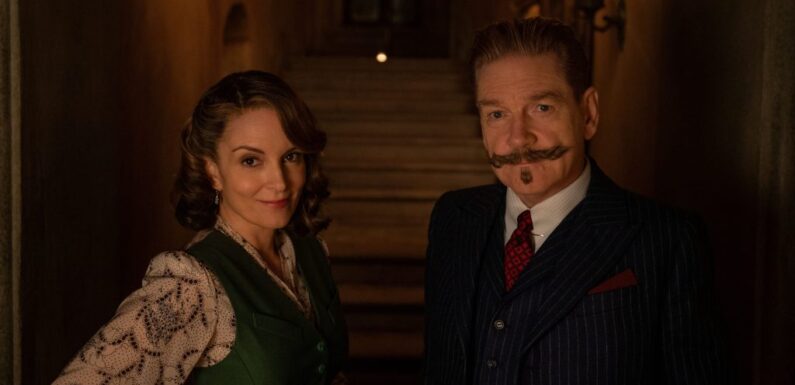
An adult-oriented crowd pleaser of the sort that seldom gets made any longer without superheroes being involved, and better than that, is quite entertaining, “A Haunting in Venice” extends 2023’s streak as the Year That Hollywood Lured Grown-Ups Back To Theaters. Less prestigious than practiced in spotlighting the star wattage of its pedigreed cast, Kenneth Branagh’s third Agatha Christie adaptation offers a nimble stopgap between drier art-house fare, traditional studio tentpoles and scrappy genre material leaching ticket sales from their pricier competitors — while satisfying all three potential audiences.
Branagh, once again pulling double duty as the film’s star and director, anchors this (possibly) supernatural digression from the shoe-leather sleuthing of earlier Hercule Poirot stories with appropriate theatricality, while playful turns from a shrewdly selected supporting cast elevate the case from just another murder mystery to suitably arch gothic horror.
Shortly after the events of “Death on the Nile,” Branagh’s Poirot is living in Venice, where he has retired comfortably enough to afford a 24-hour bodyguard, Vitale Portfoglio (Riccardo Scamarcio), to protect him from would-be clients accosting him in the streets for his services. Despite Poirot’s own insistence that he has no friends, he’s visited by one of them: Ariadne Oliver (Tina Fey), a mystery novelist who made her name by fictionalizing the misadventures of the Belgian detective. Ariadne invites Poirot to attend a Halloween-night séance of a former opera singer, Rowena Drake (Kelly Reilly), who has taken up residence in a reportedly haunted palazzo after the death of her daughter Alicia (Rowan Robinson), and he reluctantly agrees.
Upon arrival, Poirot is bombarded with all manner of myths and rumors about the building, which was once the site of an orphanage, the spirits of whose children have vowed to exact revenge upon the living. He’s appropriately skeptical of the notion of ghosts, even after the arrival of Mrs. Reynolds (Michelle Yeoh), a medium who appears to summon Alicia’s spirit during the séance. But when Poirot subsequently debunks many of Mrs. Reynolds’ methods, a fumbled attempt on his life by an unseen assailant leads to the murder of another of the attendees, prompting the retired investigator to lock the remaining survivors inside the palazzo to determine the identity of the murderer and, if possible, to uncover the truth about the phenomena he’s witnessed that could be of supernatural origin.
As with the previous films in this series (and indeed, in ensemble films like this in general), the casting is key to the success of the story, even more than the resulting solution (or solutions) to its mystery. For better or worse, the star-director takes his foot off the accelerator just a bit to play a slightly less sexy Poirot than in previous outings (that said, get someone who looks at you the way that Branagh looks at Kenneth Branagh). But his comparatively more sober take on the character is born naturally from his circumstances at the beginning of the film, even if Daniel Craig’s resuscitation of Benoit Blanc in “Glass Onion,” who was similarly smarting from inactivity before being called back into service, eats more than a little bit of Poirot’s lunch here.
Even so, who better than Tina Fey to play a self-important, slightly bullying know-it-all who conceals her questionable competence behind a thin layer of condescension? It’s a role that was seemingly born for the actress who brilliantly played Liz Lemon for seven seasons. Meanwhile, a fresh-from-her-Oscar-win Michelle Yeoh beautifully navigates a crucial but sometimes invisible line between empath and charlatan in her limited screen time as Mrs. Reynolds. Jamie Dornan probably qualifies as the next-biggest star in the cast, and he delivers more PTSD than is really required to sell his character Leslie Ferrier’s wartime field surgeon bona fides, but the intensity of his performance provides a nice counterpoint to the turn given by Jude Hill, once again playing Dornan’s onscreen child (after leading Branagh’s “Belfast”) as Leslie’s morbid, precocious son Leopold.
Gifted as they are, Reilly and Scamarcio — along with Kyle Allen as Maxime Gerard, Alicia’s former lover, Camille Cottin as Rowena’s housekeeper Olga Seminoff, and Emma Laird and Ali Khan as Mrs. Reynolds’ assistants Desdemona and Nicholas Holland — show that they understand their respective assignments enough not to stand out, except when necessary as suspects (or red herrings). Conversely, Branagh counts on his longtime cinematographer Haris Zambarloukos to emphasize the space, especially the subjective terror of being in a building whose inhabitants may not all be among the living. Although the duo don’t fully return to the comic-book dutch angles of their work on “Thor,” Zambarloukos’ extensive use of anamorphic lenses (imagine a film shot with your iPhone camera constantly set at .5 distance) amplifies the sensation of something scary lurking in the shadows or just around the corner.
If Poirot’s road back to becoming a detective after retirement feels somewhat preordained, Branagh cleverly exploits the natural allure of a good mystery, both in front of and behind the camera, to draw the audience in for a romp that’s equal parts creepy and classy. Ultimately, “A Haunting in Venice” is just spooky enough, whether you’re typically interested in getting your pants scared off or prefer a slightly more polished level of intrigue and sophistication. Mind you, it probably won’t provoke any deeper conversations than about how this legendary detective manages to keep his legendary mustache perfectly groomed even after going bobbing for apples, but aside from that most improbable suspension of disbelief, Branagh’s latest is otherwise a mostly satisfying grown-up movie.
Read More About:
Source: Read Full Article